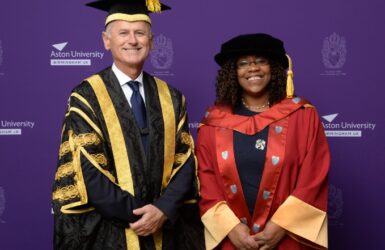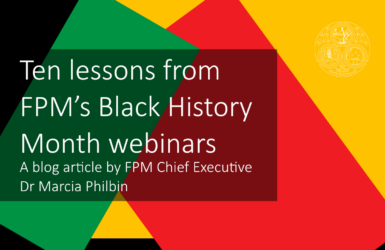FPM’s Journey to The Undiscovered Country
Posted on: Monday 5 July 2021
Author: Marcia Philbin
I am a huge fan of Star Trek, especially the original series with Captain Kirk and Mr Spock who led their intrepid crew to boldly go where no one has gone before. Gene Roddenberry was a visionary and pushed the boundaries to show what could be possible for mankind in terms of diversity, technology and collaboration with others. The Undiscovered Country was the sixth film in the franchise and centred on the Klingon Empire which was on the brink of becoming obsolete. The Klingons and the United Federation of Planets agree to enter into talks to dismantle the neutral zone which had kept the peace for many years. However, there were sceptics on both sides who did not want this to happen so they set in motion an elaborate plan to sabotage the peace talks. As always Captain Kirk, Mr Spock, Dr McCoy, Scottie, Lt. Uhura, Sulu and Chekov as well as the rest of the intrepid crew, saved the day.

The COVID-19 pandemic has allowed our members to showcase their skills, knowledge and experience in the development of medicines, vaccines as well as medical devices, and the media has noticed!
So what has this got to do with FPM?
Two years ago, in June 2019, I became Chief Executive. FPM was my Undiscovered Country and two years on, I reflect on the path I am navigating for the organisation and its members. What is incredible is that for 60% of that time, I have led the organisation remotely because of the lockdown caused by the COVID-19 pandemic. What is even more incredible is how much FPM has evolved and grown since the lockdown started. Why is this? Well, having a clear focus on what I wanted to achieve was key and my focus was threefold:
- engage the membership
- increased the income
- raise FPM’s profile.
To achieve this, I adapted McKinsey’s “The 5 Trademarks of Agile Organizations” which outlines ways for organisations to transform from the traditional ways of working to new ways which allows them to react quickly to changing circumstances caused by disruptions such as the pandemic. I adapted this model to create FPM’s House of Agile which I spoke about at the FPM Annual Symposium in 2020.
FPM’s House of Agile that enabled business continuity
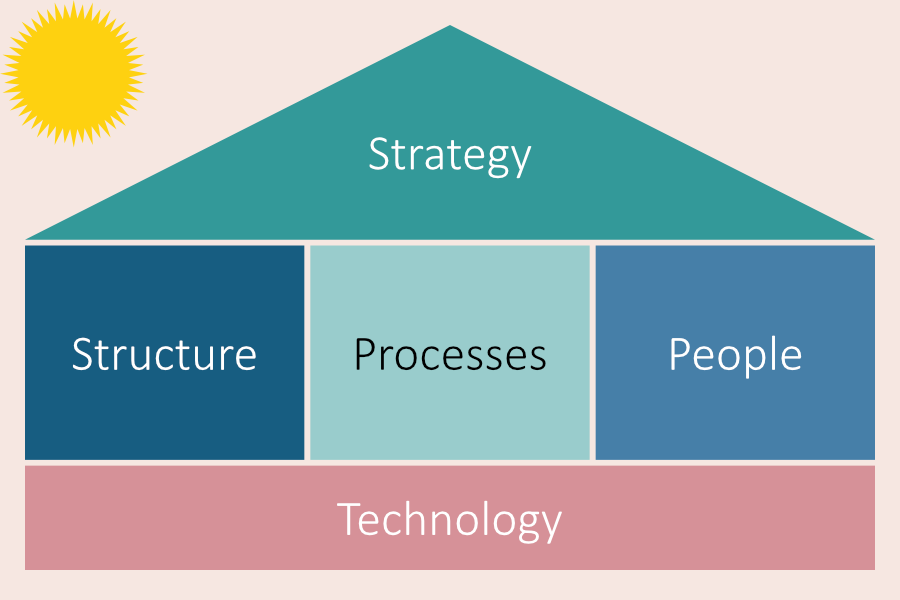
- FPM’s dynamic strategy is the roof of the house, the North Star that is steering us through the intricate gauntlet of opportunities as we navigate towards the Undiscovered Country against a backdrop of the acceleration of the 4th industrial revolution (digital economy), political disharmony, a global health pandemic and rising environmental concerns.
- The foundation of the house is the underpinning digital infrastructure and technology that ensured FPM maintained its business continuity in a virtual environment when lockdown happened. Who knew that the staff would become so skilled at using digital platforms such as Microsoft Teams, GoToMeetings and Zoom?! Also, FPM was awarded a £72,300 grant by the Dinwoodie Charitable Trust to support the digital upgrade of FPM so that it is robust for future opportunities.
- The two pillars that strengthen the House of Agile are the team structures and the staff. I created the Senior Management Team which focuses on high level operational matters and resourcing has been strengthened with new posts of the Membership and Events Manager as well as the Head of Education. FPM operates a distributed leadership model that delegates sufficient authority to empower and motivate staff.
- Integrating these elements are the revised processes and procedures that sustains FPM’s ongoing operations. In the future, as FPM moves to a smarter way of working with staff having the option to work from home for up to two days a week, it will be important to maintain the cohesive culture of FPM by underpinning it with robust processes, investment in training as well as clear expectations of performance and results.
- As a result of these developments, FPM has seen an increase in engagement by its members, has opened up new income streams that have improved its financial position, and there is greater awareness of the work of FPM, which is more than I could have envisioned. It goes without saying that none of this would have been achieved without the support of the Board of Trustees, the unswerving dedication of our many volunteers and service providers as well as the hard work of the FPM staff.
Changes in FPM
FPM embarked on a new project in 2020 as part of its focus on diversity. To understand if there are gender disparities in the specialty, we developed a project called Women in Pharmaceutical Medicine to investigate the barriers that hinder the career progression of women as well as investigate the specific experiences of black women. We were awarded funding of £10,000 from the Royal Society of Chemistry (RSC) who are supportive of the project. The final report will be issued later this year and we hope to have a launch event with the RSC.
FPM also established its virtual Journal Club in May 2020 and it has been a huge success with members. We have seen age, gender and ethnic diversity amongst those hosting sessions which demonstrates the need for such initiatives. For the first time, FPM celebrated Black History Month and Dr John Ndikum took part in a fireside chat where he expressed his thoughts on working on the frontline in a NHS Trust at the height of the pandemic. A published poet, Dr Ndikum kindly wrote a poem about the pandemic for FPM, Humanity in Calamity which has been immortalised in the FPM Annual Report 2020.
I am particularly delighted by the increase profile that FPM has achieved in the last 16 months. The COVID-19 pandemic has allowed our members to showcase their skills, knowledge and experience in the development of medicines, vaccines as well as medical devices, and the media has noticed! FPM’s media profile has seen incredible growth in the last year with over 200 enquiries compared to a handful in 2019. FPM members have appeared in many news outlet including the BBC, ITV, LBC Radio, The Guardian, The Telegraph etc.
I am so proud of what FPM has achieved in the last two years and this is just the start.
Furthermore, members have published blogs on COVID-19 and these have been accessed numerous times by other members as well as the public. The first blog which reviewed the pathology and therapeutics of COVID-19 has been downloaded over 36,000 times across the world and it has been described independently as a tour de force.
2021 continues to be a year of change for FPM. In May, the GMC approved the new PMST curriculum and work is underway with the implementation plan. The new Membership Committee has now been formed and will oversee the work on all things relating to membership. In addition, the Global Forum has been established and I have been overwhelmed with the level of interest by those who wish to be part of it. There will be digital upgrades also as projects to implement a new Customer Relationship Management system and a Learning Managing System start to take shape. The new JEDII Forum is going from strength to strength as this is a key priority for FPM and is underpinned by FPM’s new values which were launched in 2020. Lastly, FPM will have two accomplished women as President and Vice-President from November 2021.
I am so proud of what FPM has achieved in the last two years and this is just the start. FPM is on its way to the Undiscovered Country and it is my sincere hope that as we grow, those with an interest in pharmaceutical medicine will join us to go boldly where we have not been before. As Amanda Gorman said in her US Presidential inauguration poem, The Hill We Climb, “When day comes we step out of the shade, aflame and unafraid. The new dawn blooms as we free it. For there is always light, if only we’re brave enough to see it, if only we’re brave enough to be it”.
Read more from Marcia
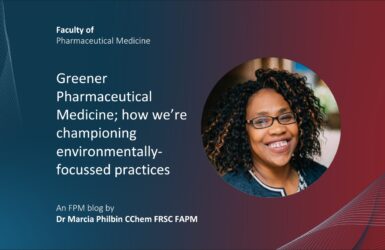
Greener Pharmaceutical Medicine; how we’re championing environmentally-focussed practices
Blog by our Chief Executive, Dr Marcia Philbin.
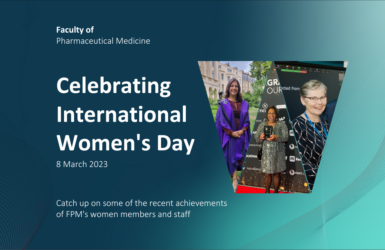
International Women’s Day 2023
Some selected highlights from our women members, volunteers and staff
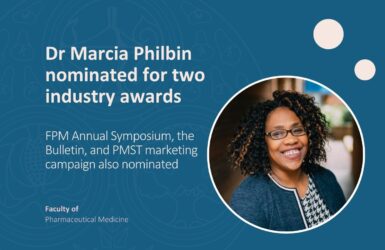
Marcia Philbin nominated for two industry awards
Annual Symposium, PMST marketing and FPM bulletin also receive recognition
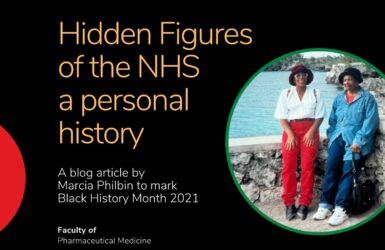
Hidden Figures of the NHS – A personal history
Blog article by our Chief Executive Dr Marcia Philbin
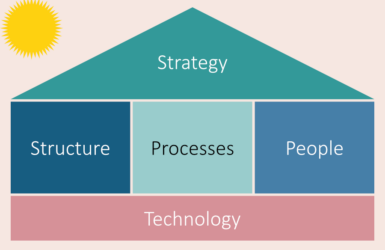
FPM’s Journey to The Undiscovered Country
Our Chief Executive Dr Marcia Philbin celebrates two years in post

